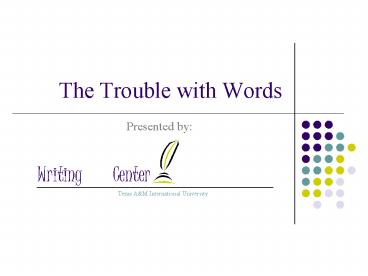The Trouble with Words - PowerPoint PPT Presentation
1 / 18
Title:
The Trouble with Words
Description:
The Trouble with Words Presented by: Writing Center Texas A&M International University Objectives: Refresh student s memory on the correct use of articles (a, an, the). – PowerPoint PPT presentation
Number of Views:110
Avg rating:3.0/5.0
Title: The Trouble with Words
1
The Trouble with Words
- Presented by
Writing Center
Texas AM International University
2
Objectives
- Refresh students memory on the correct use of
articles (a, an, the). - Explain the differences between words that sound
the same but have different meanings (homonyms).
3
An article
- Signals that a noun will follow
- May immediately precede a noun
- May be separated from a noun by modifiers
- There are two types of articles
- Definite Articles
- Indefinite Articles
4
Definite ArticleThe
- Use the when you refer to a specific something
or someone. - For example
- The book that I am reading is interesting.
5
Indefinite ArticlesA An
- Use a or an when you refer to something that
is general, singular, and countable (has a plural
form). - For example
- I found a country on the map.
- My mother works at an office.
6
Omission of Articles
- Dont use a, an, or the before general,
uncountable nouns (things that cannot be directly
counted because they do not have plural forms). - For example
- We believe in a love.
- He speaks the Portuguese.
Instead
We believe in love. (general)
He speaks Portuguese. (non-specific)
7
Homonyms
- Greek for same name
- One of two or more words that have the same
sound and often the same spelling but differ in
meaning.
8
To, Too, and Two
- To expresses motion or direction toward a point,
person, place, or thing
- Example My instructor referred me to the Writing
Center.
- Too in addition also very extremely
- Example The new student was interesting, smart,
and fun, too.
- Example The chicken is too spicy.
- Two a set of many persons or things
- Example The instructor asked that we bring two
pencils for the exam.
9
There, Their, and Theyre
- There in or at that place (opposed to here)
- Example I wish I were there instead of here.
- Their the possessive form of they used to
show ownership
- Example The students used their skills to get an
A on their exams.
- Theyre contraction of they are
- Example Theyre running out of things to write
about. Its time to brainstorm!
10
Are, Or, and Our
- Are plural form of to be
- Example There are many reasons why I do not want
to take this exam.
- Or Used to connect words that are alternatives
- Example Do you need a pencil or a pen for the
exam?
- Our possessive form of we
- Example Our only hope of passing is to do our
work and do it well.
11
Its and Its
- Its the possessive form of it
- Example The book has lost its cover.
- Its contraction of it is
- Example Its important for you to prepare for
the exam.
12
Your and Youre
- Your possessive form of you indicates what
belongs to ones self
- Example Your ideas on the essay are interesting
and thought-provoking.
- Youre contraction of you are
- Example Youre very good at explaining your
ideas.
13
Whose and Whos
- Whose The possessive form of who
- Example Whose homework is this?
- Whos Contraction of who is or who has
- Example Whos answering the phone?
- Example Whos seen the new play?
14
Very and Vary
- Very extremely exceedingly
- Example The grade on my exam was very low.
- Vary to be different from something else
- Example Peoples opinions on abortion vary
greatly.
15
Affect and Effect
- Affect to act on produce a change in
- Example His words affected the crowd so deeply
that many wept.
- Effect to bring about, accomplish
- Example Exposure to the sun had a negative
effect on his skin.
16
Than and Then
- Than to make an unequal comparison
- Example This exam was much easier than the first
exam I took.
- Then as a consequence in those circumstances
- Example If you dont study, then you cannot
expect to understand the lecture.
17
This and These
- This used to identify a specific singular item
or object
- Example This test is easier than I thought.
- These used to identify specific plural items or
objects
- Example These students will pass the test with
high grades.
18
Shouldve and Should of
- Shouldve contraction of should have
- Example I shouldve tried harder. I know that I
am capable of earning an A.
- Should of
DOES NOT EXIST































